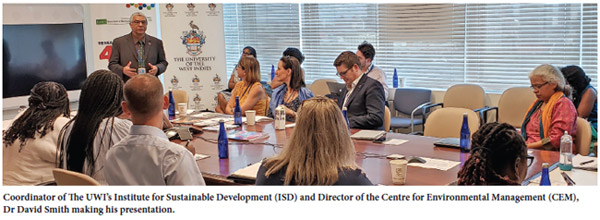

 Universities play a unique role in helping countries achieve the United Nation’s (UN) Sustainable Development Goals (SDGs) by serving as drivers of knowledge, innovation, development solutions and partnerships. It is in this context that the Global University Consortium on SDG13 met during the UNs’ High-Level Political Forum 2019 (HLPF) on Sustainable Development in New York in July 2019. Universities play a unique role in helping countries achieve the United Nation’s (UN) Sustainable Development Goals (SDGs) by serving as drivers of knowledge, innovation, development solutions and partnerships. It is in this context that the Global University Consortium on SDG13 met during the UNs’ High-Level Political Forum 2019 (HLPF) on Sustainable Development in New York in July 2019.
Following its strategic agenda and role as a global leader in the mobilisation of research and advocacy for the achievement of a climate-smart world during the forum on July 12, The UWI led a symposium themed “Research and Innovation 4 Climate Action” together with the United Nations Department of Economic and Social Affairs (UNDESA). The UWI’s Director of Development, Dr Stacy Richards-Kennedy, served as moderator. Coordinator of the University’s Institute for Sustainable Development (ISD) and Director of the Centre for Environmental Management (CEM) Dr David Smith presented at the symposium together with Vice-Chancellor of TERI School of Advanced Studies Dr Leena Srivastava, University of Bergen’s Dr Helga Kleiven, and SUNY College of Environmental Science and Forestry representative Mr Justin Heavey.
This side-event at the High Level Political Forum demonstrated how higher education institutions (HEIs) under the Global University Consortium are making contributions to address climate change. Among the highlights were showcases of strides made in research in the fields of biomass energy, carbon sequestration, climate resilient design, and educational outreach and impact.
The HEIs also showcased the cross-cutting approach of the consortium to SDGs 4, 13 and 17. However, more importantly, the symposium provided an opportunity for HEIs to share ground-breaking research and knowledge with a view to influencing new ways of thinking, policy debates and industry practice.
Some of the discussions focused on integrating the social sciences into the climate agenda in order to deliver maximum impact to society; leveraging the knowledge generated by HEIs to influence policy and government decision-making; and ensuring the most vulnerable countries and social groups are not left behind or forgotten in climate action planning.
Attendees included representatives from UN agencies such as UNDESA, the United Nations Economic Commission for Latin America and the Caribbean (UNECLAC) and World Food Programme. Other participating HEIs and HEI associations included the Association of Commonwealth Universities (ACU), International Association of Universities (IAU) and the University of Bologna. Representatives from government organisations from the Parliament of Czech Republic, the Permanent Mission of Jamaica, the Government of Canada as well as the International Disability Alliance were also in attendance.
Stemming from the symposium, the attendees resolved to deepen existing partnerships and explore new collaboration models on research, education, and resource mobilisation for climate action.
|





